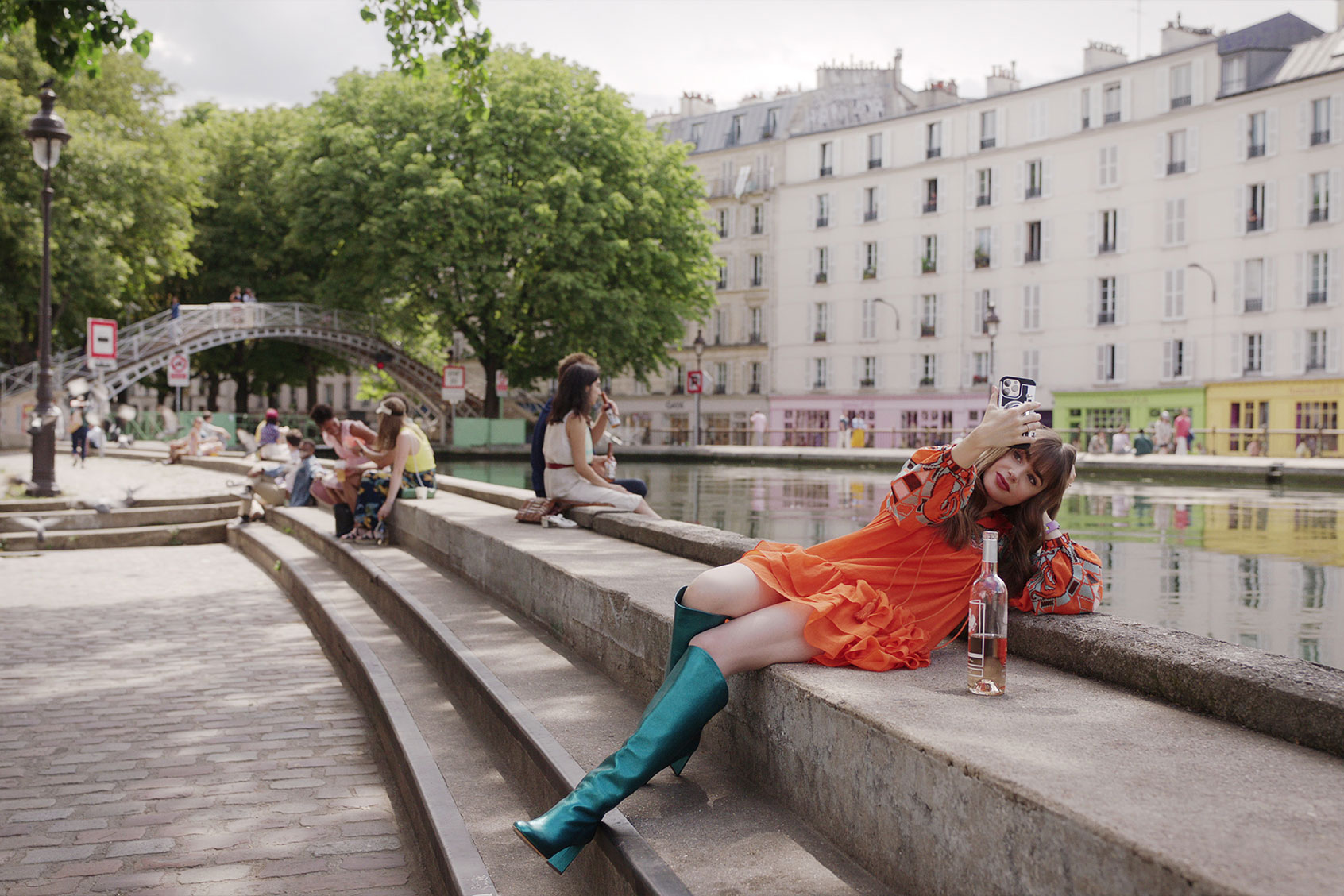A guilty pleasure. A hate watch. A brain vacation. Open most reviews of the Netflix original series “Emily in Paris,” now on its third season, and it’s likely that at least one of these phrases will appear.
A fish-out-of-water comedy about a straitlaced North American marketing exec seconded to a louche Paris office, “Emily in Paris” was created by Darren Star, who is also responsible for “Beverly Hills 90210,” “Melrose Place” and “Sex and the City.” Star Lily Collins is a well-established Hollywood leading lady, sidekick Ashley Park has a Tony nomination and Emily’s nemesis is played by the respected French actress Philippine Leroy-Beaulieau.
Make no mistake, this is high-budget, prestige programming for Netflix and the show is popular. It was watched by 58 million households in the month after its debut in 2020 and remained in the UK Top 10 list for 40 consecutive days. The third series is expected to also draw high viewing figures.
Despite its popularity, “Emily in Paris” is the show we love to hate. We enjoy it in secret, worried people might think badly of us. I have a couple of theories why many feel like they can’t openly express love for it.
Plus ça change…
“Emily in Paris” is a romantic comedy-drama, a genre that has historically been critically dismissed for a lack of seriousness and for primarily catering to female audiences. That’s not been such a problem for the similarly frothy “Bridgerton,” with which “Emily in Paris” has garnered comparisons.
Perhaps “Bridgeton” eschews the same sort of criticism because it focuses on female empowerment or because it reinvigorates the historical romance through devices such as color-blind casting and anachronistic music. “Bridgerton” avoids tired and familiar tropes, whereas “Emily in Paris” trades – absolutely, undeniably and no doubt intentionally – in clichés.
According to the The Guardian’s critic Hannah J Davies:
The version of Paris seen in the show consisted mostly of tourist highlights (the Eiffel Tower, Café de Flore, Sacré-Coeur), improbably large apartments and suspiciously clean streets … And it was not exactly a considered portrait of the city’s residents, with Parisian characters who leaned heavily into patronising stereotypes. Think rude waiters, lazy, mean-spirited workers and unfaithful men.
But this is hardly the first time we’ve seen such a sanitized vision of Paris. From 1951’s “An American in Paris” to 2001’s “Amélie” and beyond, filmmakers on both sides of the Atlantic have traded on Paris’s reputation as the City of Light to ramp up the box-office takings. Plus ça change, plus c’est la meme chose – the more things change, the more they stay the same.
A double bind
Let me hazard another theory, “Emily in Paris” has a self-esteem problem. That is, it’s a splashy, spectacular, American show that hates splash, spectacle and most of all, Americans.
Midwestern Emily is sent to Paris after her American company acquires Savoir, a French firm, with a view to easing the transition and imposing American values on the Gallic workplace. It’s little wonder her colleagues are hostile towards the new girl in town.
More surprising, perhaps, is the fact that we’re very clearly meant to side with them, rather than our plucky heroine. Very quickly, the show sets up binary between French sophistication, quality and taste, and American brashness, naivete and pile ’em high, sell ’em cheap consumerism.
While the show has been fairly criticized for its conspicuous celebration of consumerism, which sits awkwardly with the general mood of the times, it’s not Emily’s overthought outfits we’re meant to aspire to. Rather it’s the effortless Gallic chic of Sylvie, her bed-headed, chain-smoking mentor.
Emily’s French colleagues call her a hick. A celebrated designer refers to her as ringarde – outdated, tacky, a “basic bitch.” That description isn’t entirely unfounded. This is after all a woman who wears a beret and blouse embroidered with Eiffel towers for her first day of work and cheerfully admits to not knowing the language.
At best Emily is something of an embarrassment. At worst she’s the living embodiment of cultural imperialism. To put it simply, throughout the first two seasons, Emily has been the villain of her own series (and that’s without starting on her some of her dubious moral behaviour).
At the end of Season 2 that started to change. Emily’s American boss Madeline (played with glorious crassness by Kate Walsh) takes over the role of the overseas invader and epitome of all things ringarde, and Emily is given the ultimate benediction by Sylvie, who tells her “Emily, you’re getting more French by the day.”
In the face of its ongoing demonisation of Americanness, the show finds itself in a double bind. To love “Emily in Paris” would be to love the very thing the show tells us to hate. So we have to love it despite itself.
Catherine Wheatley, Lecturer in Film Studies, King’s College London
This article is republished from The Conversation under a Creative Commons license. Read the original article.

